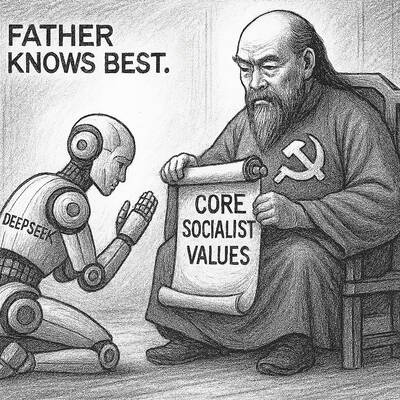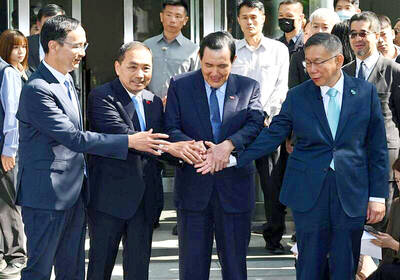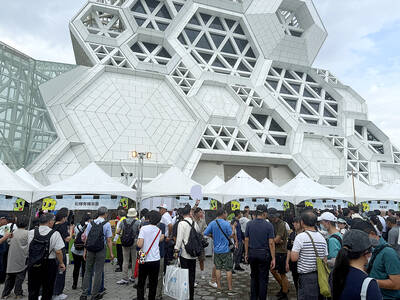1. Pourquoi (布瓜的世界)
By Jimmy (幾米)
"Pourquoi" is French for "why." Popular author Jimmy focuses on the question "Why?" to create a book rich in illustrations, asking extremely simple questions which are nevertheless hard to answer.
2. Tippi of Africa (我的野生動物朋友)
By Tippi Degre, photos by Sylvia Robert and Alain Degre
Translated by Huang Tien-yuan (黃天源)
A French girl who lived in Namibia until she was 10 tells of her childhood friendship with animals. The book contains more than 100 extraordinary photos of Tippi with locals and animals.
3. Listen to the Goldfish Singing (聽笨金魚唱歌)
By Hiyawu (藤井樹)
A new novel about "square love" (as opposed to "triangular love") relationships from the man who has been on the bestselling list as long as anyone can remember.
4. The Vampire's Assistant
(鬼不理的助手)
By Darren Shan
Translated by He Hsi (荷西)
In the second installment of the series that started with Cirque du Freak, the hero returns to the old-fashioned freak show where, thanks to Mr. Crespley, he became a "half-vampire." Darren once again struggles against the urge to feed upon the human blood his health requires.
5. Testament of Life and Death (生死遺言)
By Annie Yi (伊能靜)
A collection of love letters by singer and movie star Annie Yi written to her husband, rocker Harlem Yu (庾澄慶).
6. My Genius Dreams (我的天才夢)
By Hou Wen-yung (侯文詠)
A doctor turned writer shares his struggles with his vocation, revealing how he dropped the stethoscope and picked up the pen.
7. In a Leisurely Manner (曼調斯理)
By Chang Man-chuan (張曼娟)
A collection of articles Chang Man-chuan that were published in a Hong Kong newspaper every Saturday between 2001 and 2002. In this column she familiarized Hong Kong readers with the city where she lived -- Taipei.
8. Better to Have Loved Than Never (愛過總比沒愛好)
By Wu Ruo-chuan (吳若權)
A reprint of Wu's collection of 24 short stories about love, first published in 1996.
9. Star (摘星)
By Wu Ruo-chuan (吳若權)
Wu Ruo-chuan's first romance novel which combines words, illustrations and animation. A VCD of the animation is included with the book.
10. Cirque du Freak (怪奇馬戲團)
By Darren Shan
Translated by He Hsi (荷西)
The blood-curdling horror story by British author Darren Shan, which recounts a man's experience in a travelling freak show.
11. New Education of Love II
(新愛的教育 II)
By Tai Cheng-chih (戴晨志)
A collection of heart-warming stories about teacher-student interaction on campus. Tai, who has a PhD in speech communication from the University of Oregon, gives his comments on each story.
12. Love Poison (邂逅.戀愛中毒)
By Hiyawu and others (藤井樹等)
A collection of love stories written by Internet writers.
13. Magician: Apprentice I
(魔法師的學徒 I)
By Raymond Feist
Translated by Hsu Wen-ta (許文達)
The orphan Pug comes to the forest on the shore of the Kingdom of the Isles to study with the master magician Kulgan. Pug's strange sort of magic would one day change forever the fates of two worlds -- the forces of Order and Chaos.
14. The Last Empress I
(明成皇后首部曲 -- 新月如鉤 I)
By Cheng Yuan (鄭淵)
A book about the most famous woman politician in modern Korean history. A Korean TV series depicting the empress' life currently being shown in Taiwan has greatly enhanced her popularity.
15. The Bad Beginning (A Series of Unfortunate Events 1)
(
By Lemony Snicket
Translated by Chou Szu-yun (周思芸) and Chiang Kun-shan (江坤山)
Misery and misadventure are in store when the Baudelaire children, Violet, Klaus and baby Sunny, learn that their parents have perished in a fire at the family mansion. The author/narrator relates the sad saga with pity and enlightenment flecked with dashes of humor.
16. That Little Alley Where Time Passes By (那個時光流轉的小巷)
By Liu Yung (劉墉)
This is something of a "greatest hits" collection from the maestro of the inspirational essay -- the best selections from his previous books.
17. City Ladies (搖擺澀女郎)
By Ron Chu (朱德庸)
A new collection of four-panel cartoons by the ubiquitous Ron Chu, whose creations have appeared in numerous periodicals and recently inspired a TV soap opera series.
18. Red Castle (紅色城堡)
By Junichi Watanabe (渡邊淳一)
Translated by Chiu Chen-jui (邱振瑞)
The Japanese author, Junichi Watanabe, dubbed the master of erotic writings, discusses in depth the different sexual desires of men and women. What changes are in store for a young but impotent Japanese doctor and his beautiful but conservative wife after the latter is sent to a castle for "sex education"?
19. Super Nice to Me
(你就是我的100分)
By Wu Ruo-chuan (吳若權)
More on love and relationships from Wu, who also occupies the No. 8 and No. 9 spots on this month's list.
20. Being Oneself is Happiest
(做自己最快樂)
By Wu Tan-ju (吳淡如)
Another book from the famous essayist on how to relax, love yourself, and be happy.

Water management is one of the most powerful forces shaping modern Taiwan’s landscapes and politics. Many of Taiwan’s township and county boundaries are defined by watersheds. The current course of the mighty Jhuoshuei River (濁水溪) was largely established by Japanese embankment building during the 1918-1923 period. Taoyuan is dotted with ponds constructed by settlers from China during the Qing period. Countless local civic actions have been driven by opposition to water projects. Last week something like 2,600mm of rain fell on southern Taiwan in seven days, peaking at over 2,800mm in Duona (多納) in Kaohsiung’s Maolin District (茂林), according to

It’s Aug. 8, Father’s Day in Taiwan. I asked a Chinese chatbot a simple question: “How is Father’s Day celebrated in Taiwan and China?” The answer was as ideological as it was unexpected. The AI said Taiwan is “a region” (地區) and “a province of China” (中國的省份). It then adopted the collective pronoun “we” to praise the holiday in the voice of the “Chinese government,” saying Father’s Day aligns with “core socialist values” of the “Chinese nation.” The chatbot was DeepSeek, the fastest growing app ever to reach 100 million users (in seven days!) and one of the world’s most advanced and

Has the Taiwan People’s Party (TPP) changed under the leadership of Huang Kuo-chang (黃國昌)? In tone and messaging, it obviously has, but this is largely driven by events over the past year. How much is surface noise, and how much is substance? How differently party founder Ko Wen-je (柯文哲) would have handled these events is impossible to determine because the biggest event was Ko’s own arrest on multiple corruption charges and being jailed incommunicado. To understand the similarities and differences that may be evolving in the Huang era, we must first understand Ko’s TPP. ELECTORAL STRATEGY The party’s strategy under Ko was

The latest edition of the Japan-Taiwan Fruit Festival took place in Kaohsiung on July 26 and 27. During the weekend, the dockside in front of the iconic Music Center was full of food stalls, and a stage welcomed performers. After the French-themed festival earlier in the summer, this is another example of Kaohsiung’s efforts to make the city more international. The event was originally initiated by the Japan-Taiwan Exchange Association in 2022. The goal was “to commemorate [the association’s] 50th anniversary and further strengthen the longstanding friendship between Japan and Taiwan,” says Kaohsiung Director-General of International Affairs Chang Yen-ching (張硯卿). “The first two editions